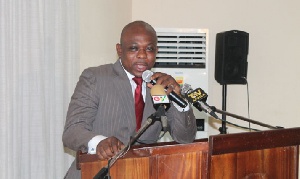 The Deputy Minister of the Interior, James Agalga
The Deputy Minister of the Interior, James Agalga
A bill that seeks to, among other things, decriminalise drug addiction and use is currently before Parliament for consideration and approval.
he Narcotic Control Commission Bill, 2015, which went through the Second Reading in Parliament yesterday, has proposed the decriminalisation of drug use and addiction.
As a result, drug use and addiction would no longer be a punishable offence when the House passes the bill into law.
The Deputy Minister of the Interior, James Agalga, who moved the motion for the Second Reading of the bill, said that instead, drug addiction would be treated as a health issue, and added that offenders would be taken to correctional facilities for assistance.
“This will make it possible for us to put up facilities for the rehabilitation of drug addicts. This is a new development that the new bill seeks to cater for,”he said.
However, the importation and exportation of narcotic drugs, illegal possession of drugs, businesses related to narcotics, cultivation of plants for narcotic purposes, are still criminal offences punishable by fines or terms of imprisonment ranging between five and 20 years.
Also, the deputy minister said the new bill would transform the existing Narcotic Control Board (NACOB) into a commission with a wide range of powers, which would make it effective.
The bill gives the state the power to seize the properties of persons convicted of narcotic related offences.
This is because the Narcotic Drugs (control, enforcement and sanctions) Act, 1990 (PNDCL 236), which has been in existence for the past 26 years restricts the confiscation of properties belonging to persons convicted of narcotic related offences.
Aside that, the PNDCL236 does not adequately deal with the freezing of accounts of drug dealers.
The Narcotics Control Commission Bill, 2015 seeks to address the weaknesses in the PNDCL 236 by giving powers to the state to confiscate the properties of drug dealers and freeze their accounts.
The bill gives the Attorney-General’s (A-G) Department the power to apply to a court for a confiscation order and confiscate the properties of drug convicts if it has reasons to believe that the properties are “tainted”.
The A-G may apply to either the Circuit Court or the High Court which has original jurisdiction over drug related offences under the bill for the confiscation order.
The bill also deals with circumstances where there is suspicion of money laundering and has incorporated the Anti-Money Laundering Act, 2008 (Act 749) by reference.
The Chairman of the Committee on Defence and the Interior, Fritz Baffour, who seconded the motion for the Second Reading of the bill, said the bill was laid in Parliament on October 27 and referred to his committee for consideration and report.
He recommended to the House to pass the bill into law to enable the state to deal with drug related offences effectively.
The Member of Parliament of Effutu, Alexander Afenyo Markin, commended the efforts of the government in bringing the bill into the House.
He, however, urged the NACOB to operate within its mandates as stipulated in the bill and not veer into matters it did not have legal powers over.